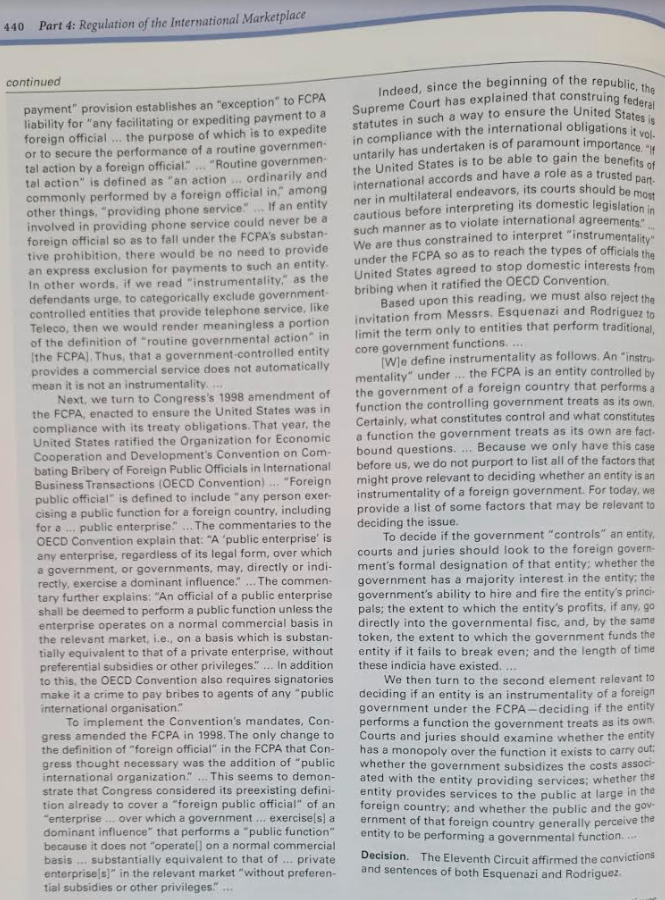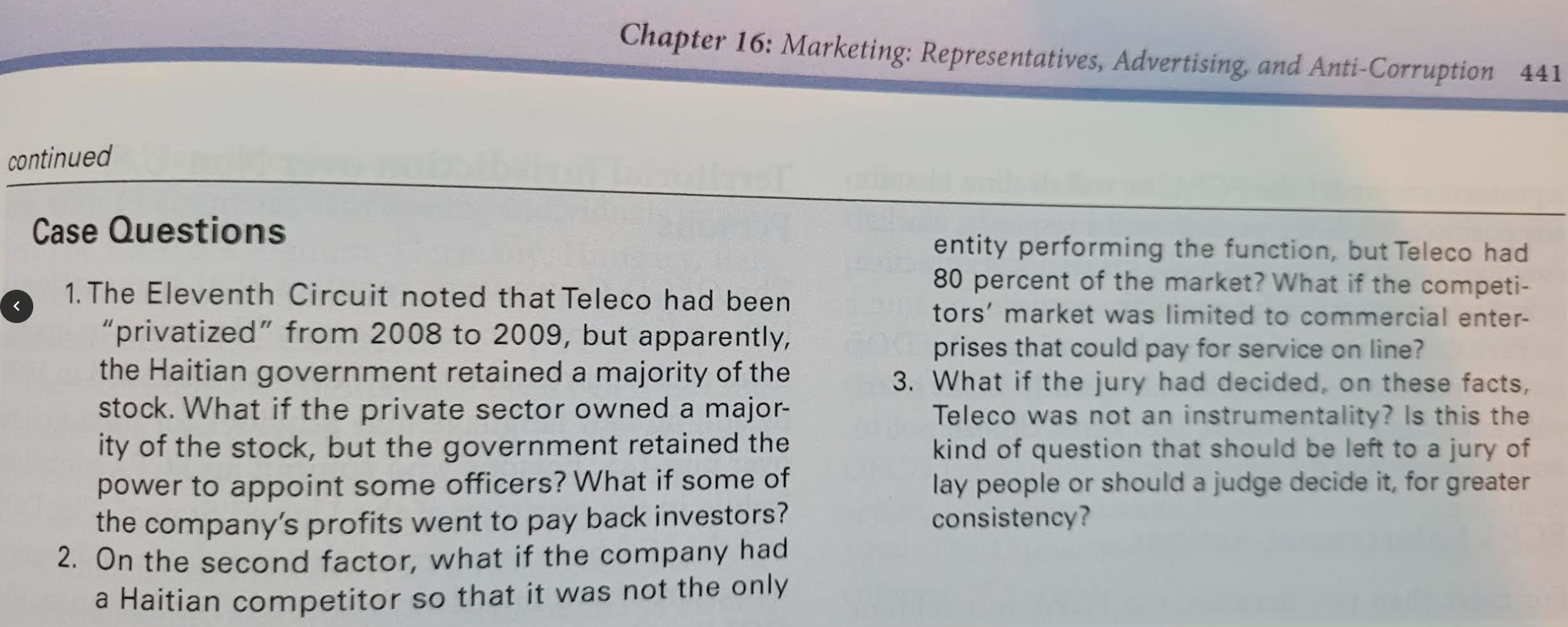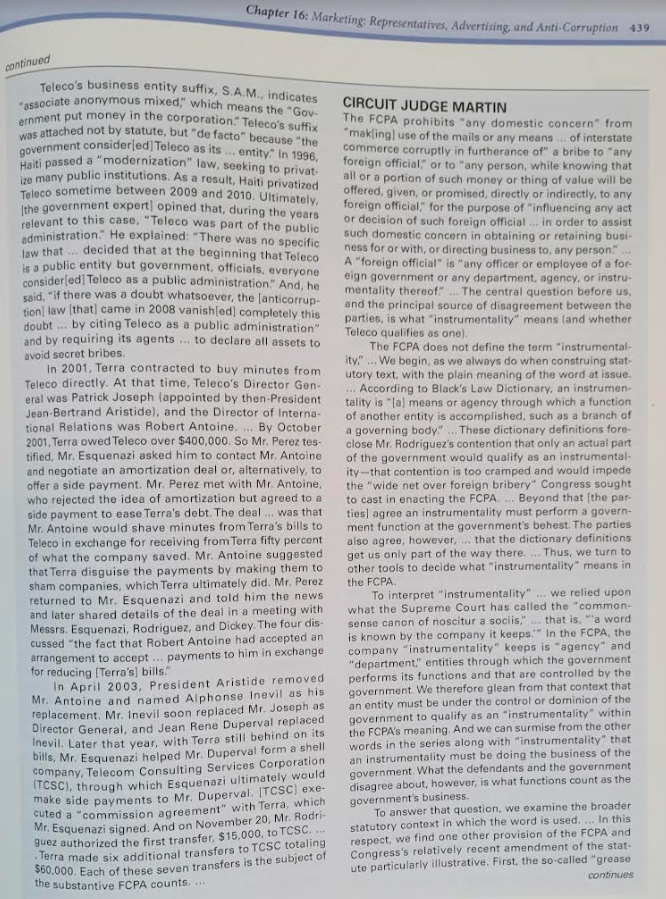



Complete the Case Questions:
440 Part 4: Regulation of the International Marketplace continued payment" provision establishes an "exception" to FCPA Indeed, since the beginning of the republic, the liability for "any facilitating or expediting payment to a Supreme Court has explained that construing federal foreign official ... the purpose of which is to expedite statutes in such a way to ensure the United States is or to secure the performance of a routine governmen. in compliance with the international obligations it vol. tal action by a foreign official" ... "Routine governmen untarily has undertaken is of paramount importance. "If tal action" is defined as "an action ... ordinarily and the United States is to be able to gain the benefits of commonly performed by a foreign official in," among international accords and have a role as a trusted part. other things, "providing phone service." .. If an entity ner in multilateral endeavors, its courts should be most involved in providing phone service could never be a cautious before interpreting its domestic legislation in foreign official so as to fall under the FCPA's substan- such manner as to violate international agreements." tive prohibition, there would be no need to provide We are thus constrained to interpret "instrumen an express exclusion for payments to such an entity. under the FCPA so as to reach the types of officials the In other words, if we read "instrumentality," as the United States agreed to stop domestic interests from defendants urge, to categorically exclude government- bribing when it ratified the OECD Convention. controlled entities that provide telephone service, like Based upon this reading, we must also reject the Teleco, then we would render meaningless a portion invitation from Messrs. Esquenazi and Rodriguez to of the definition of "routine governmental action" in limit the term only to entities that perform traditional, [the FCPA]. Thus, that a government-controlled entity core government functions. ... provides a commercial service does not automatically [We define instrumentality as follows. An "instru- mean it is not an instrumentality. ... mentality" under ... the FCPA is an entity controlled by Next, we turn to Congress's 1998 amendment of the government of a foreign country that performs a the FCPA, enacted to ensure the United States was in function the controlling government treats as its own, compliance with its treaty obligations. That year, the Certainly, what constitutes control and what constitutes United States ratified the Organization for Economic a function the government treats as its own are fact. Cooperation and Development's Convention on Com- bound questions. ... Because we only have this case bating Bribery of Foreign Public Officials in International before us, we do not purport to list all of the factors that Business Transactions (OECD Convention) ... "Foreign might prove relevant to deciding whether an entity is an public official" is defined to include " any person exer- instrumentality of a foreign government. For today, we cising a public function for a foreign country, including provide a list of some factors that may be relevant to for a ... public enterprise." ... The commentaries to the deciding the issue. OECD Convention explain that: "A 'public enterprise' is To decide if the government "controls" an entity, any enterprise, regardless of its legal form, over which courts and juries should look to the foreign govern government, or governments, may, directly or indi- ment's formal designation of that entity; whether the rectly, exercise a dominant influence." ... The commen- government has a majority interest in the entity; the tary further explains: "An official of a public enterprise government's ability to hire and fire the entity's princi- shall be deemed to perform a public function unless the pals; the extent to which the entity's profits, if any, go enterprise operates on a normal commercial basis in directly into the governmental fisc, and, by the same the relevant market, i.e., on a basis which is substan- token, the extent to which the government funds the tially equivalent to that of a private enterprise, without entity if it fails to break even; and the length of time preferential subsidies or other privileges." ... In addition these indicia have existed. ... to this, the OECD Convention also requires signatories We then turn to the second element relevant to make it a crime to pay bribes to agents of any "public international organisation." deciding if an entity is an instrumentality of a foreign To implement the Convention's mandates, Con- government under the FCPA-deciding if the entity gress amended the FCPA in 1998. The only change to performs a function the government treats as its own. the definition of "foreign official" in the FCPA that Con- Courts and juries should examine whether the entity gress thought necessary was the addition of "public has a monopoly over the function it exists to carry out; international organization." ... This seems to demon- whether the government subsidizes the costs associ- strate that Congress considered its preexisting defini- ated with the entity providing services; whether the eady to cover a "foreign public official" of an entity provides services to the public at large in the "enterprise ... over which a government ... exercise(s] a foreign country; and whether the public and the gov- dominant influence" that performs a "public function" ernment of that foreign country generally perceive the because it does not "operatell on a normal commercial entity to be performing a governmental function. . basis ... substantially equivalent to that of ... private Decision. The Eleventh Circuit affirmed the convictions enterprise[s]" in the relevant market "without preferen- and sentences of both Esquenazi and Rodriguez. tial subsidies or other privileges."...Chapter 16: Marketing: Representatives, Advertising, and Anti-Corruption 441 continued Case Questions entity performing the function, but Teleco had 1. The Eleventh Circuit noted that Teleco had been 80 percent of the market? What if the competi- "privatized" from 2008 to 2009, but apparently, tors' market was limited to commercial enter- prises that could pay for service on line? the Haitian government retained a majority of the 3. What if the jury had decided, on these facts, stock. What if the private sector owned a major- Teleco was not an instrumentality? Is this the ity of the stock, but the government retained the kind of question that should be left to a jury of power to appoint some officers? What if some of lay people or should a judge decide it, for greater the company's profits went to pay back investors? consistency? 2. On the second factor, what if the company had a Haitian competitor so that it was not the onlyChapter 16: Marketing: Representatives, Advertising, and Anti-Corruption 439 continued Teleco's business entity suffix, S.A.M., indicates "associate anonymous mixed," which means the "Gov- CIRCUIT JUDGE MARTIN ernment put money in the corporation." Teleco's suffix was attached not by d not by statute, but "de facto" because "the The FCPA prohibits "any domestic concern" from government considered] Teleco as its ... entity." In 1996, "maklingl use of the mails or any means ... of interstate Haiti passed a "modernization" law, seeking to privat- commerce corruptly in furtherance of" a bribe to " any foreign official," or to "any person, while knowing that ize many public institutions. As a result, Haiti privatized all or a portion of such money or thing of value will be Teleco sometime between 2009 and 2010. Ultimately, offered, given, or promised, directly or indirectly, to any [the government expert] opined that, during the years foreign official," for the purpose of "influencing any act relevant to this case. "Teleco was part of the public or decision of such foreign official ... in order to assist administration." He explained: "There was no specific such domestic concern in obtaining or retaining busi- law that ... decided that at the beginning that Teleco ness for or with, or directing business to, any person."... is a public entity but government, officials, everyone A "foreign official" is "any officer or employee of a for- consider[ed] Teleco as a public administration," And, he eignagovernment or any department, agency, or instru- said, "if there was a doubt whatsoever, the [anticorrup mentality thereof." ... The central question before us, tion] law [that] came in 2008 vanish[ed] completely this and the principal source of disagreement between the doubt ... by citing Teleco as a public administration" parties, is what "instrumentality" means (and whether and by requiring its agents ... to declare all assets to Teleco qualifies as one). avoid secret bribes. The FCPA does not define the term "instrumental- In 2001, Terra contracted to buy minutes from ity," ... We begin, as we always do when construing stat- Teleco directly. At that time, Teleco's Director Gen- utory text, with the plain meaning of the word at issue. eral was Patrick Joseph (appointed by then-President ... According to Black's Law Dictionary, an instrumen- Jean-Bertrand Aristide), and the Director of Interna- tality is "[al means or agency through which a function tional Relations was Robert Antoine. ... By October of another entity is accomplished, such as a branch of a governing body." ... These dictionary definitions fore- 2001, Terra owed Teleco over $400,000. So Mr, Perez tes- close Mr. Rodriguez's contention that only an actual part tified, Mr. Esquenazi asked him to contact Mr. Antoine of the government would qualify as an instrumental- and negotiate an amortization deal or, alternatively, to ity -that contention is too cramped and would impede offer a side payment. Mr. Perez met with Mr. Antoine, the "wide net over foreign bribery" Congress sought who rejected the idea of amortization but agreed to a to cast in enacting the FCPA. ... Beyond that [the par- side payment to ease Terra's debt. The deal ... was that ties] agree an instrumentality must perform a govern- Mr. Antoine would shave minutes from Terra's bills to ment function at the government's behest. The parties Teleco in exchange for receiving from Terra fifty percent also agree, however, ... that the dictionary definitions of what the company saved. Mr. Antoine suggested get us only part of the way there. ... Thus, we turn to that Terra disguise the payments by making them to other tools to decide what "instrumentality" means in sham companies, which Terra ultimately did. Mr. Perez the FCPA. returned to Mr. Esquenazi and told him the news To interpret "instrumentality" ... we relied upon and later shared details of the deal in a meeting with what the Supreme Court has called the "common- Messrs. Esquenazi, Rodriguez, and Dickey. The four dis- sense canon of noscitur a sociis," ... that is, " a word cussed "the fact that Robert Antoine had accepted an is known by the company it keeps."" In the FCPA, the arrangement to accept ... payments to him in exchange company "instrumentality" keeps is "agency" and for reducing [ Terra's] bills." "department," entities through which the government In April 2003, President Aristide removed performs its functions and that are controlled by the Mr. Antoine and named Alphonse Inevil as his government. We therefore glean from that context that replacement. Mr. Inevil soon replaced Mr. Joseph as an entity must be under the control or dominion of the Director General, and Jean Rene Duperval replaced government to qualify as an "instrumentality" within Inevil. Later that year, with Terra still behind on its the FCPA's meaning. And we can surmise from the other bills, Mr. Esquenazi helped Mr. Duperval form a shell words in the series along with "instrumentality" that company, Telecom Consulting Services Corporation an instrumentality must be doing the business of the (TCSC), through which Esquenazi ultimately would government. What the defendants and the government make side payments to Mr. Duperval. [TCSC] exe- disagree about, however, is what functions count as the cuted a "commission agreement" with Terra, which government's business. To answer that question, we examine the broader Mr. Esquenazi signed. And on November 20, Mr. Rodri- statutory context in which the word is used. ... In this guez authorized the first transfer, $15,000, to TCSC. .. respect, we find one other provision of the FCPA and Terra made six additional transfers to TCSC totaling Congress's relatively recent amendment of the stat- $60,000. Each of these seven transfers is the subject of ute particularly illustrative. First, the so-called "grease the substantive FCPA counts. ... continuesUnited States of America v. Joel Esquenazi, Carlos Rodriguez 752 F.3d 912 (11th Cir. 2014), cert. denied, 135 S. Ct. 293 (2014) United States Court of Appeals (11th Circuit) BACKGROUND AND FACTS Esquenazi and Rodriguez, [a witness] called Teleco an Messrs. Esquenazi and Rodriguez co-owned Terra "instrumentality" of the Haitian government. ... AtTele- Telecommunications Corp. (Terra), a Florida company co's formation in 1968, the Haitian government gave that purchased phone time from foreign vendors and the company a monopoly on telecommunication ser- resold the minutes to customers in the United States. vices. Teleco had significant tax advantages and, at its Mr. Esquenazi, Terra's majority owner, served as Pres- inception, the government appointed two members of ident and Chief Executive Officer. Mr. Rodriguez, the Teleco's board of directors. Haiti's President appointed company's minority owner, served as Executive Vice Teleco's Director General, its top position, by an exec- President of Operations. James Dickey served as Terra's utive order that was also signed by the Haitian Prime general counsel and Antonio Perez as the company's Minister, the minister of public works, and the min- comptroller. ister of economy and finance. In the early 1970s, the One of Terra's main vendors was Telecommunica National Bank of Haiti gained 97 percent ownership of tions D'Haiti, S.A.M. (Teleco). Because the relationship Teleco. From that time forward, the Haitian President of Teleco to the Haitian government was, and remains, appointed all of Teleco's board members. Sometime at issue in this case, the government presented evi- later, the National Bank of Haiti split into two separate dence of Teleco's ties to Haiti. [One witness] testified entities, one of which was the Banque de la Republique that Teleco was owned by Haiti. An insurance broker ... d'Haiti (BRH). BRH, the central bank of Haiti, is roughly testified that, when Messrs. Rodriguez and Esquenazi equivalent to the United States Federal Reserve. BRH were involved in previous contract negotiations with Teleco, they sought political-risk insurance, a type of retained ownership of Teleco. In [the government coverage that applies only when a foreign government expert's] opinion, for the years relevant to this case, is party to an agreement. In emails ... copied to Messrs. Teleco belonged "totally to the state" and "was consid ered ... a public entity."














